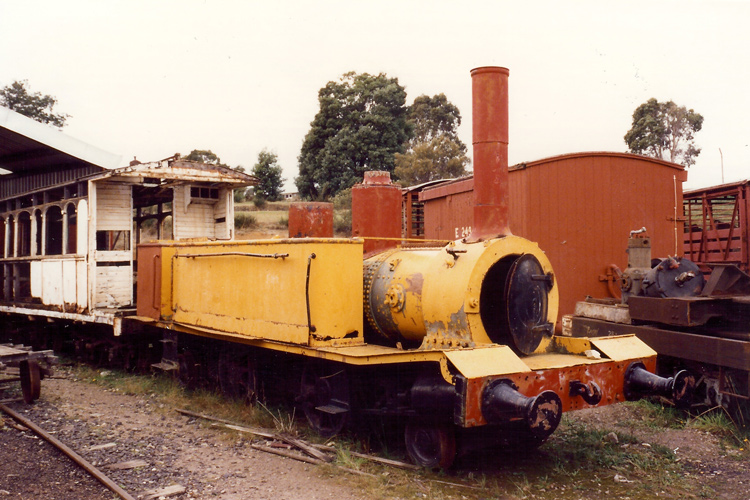|
|
4D9 No.131 Inveresk Railway Precinct |
|

4D9 class loco No.131 seen at the Don River Railway on 8
May 2003.
An extension to the original stovepipe
chimney has been welded on at some stage.
The bent handrail alongside the boiler suggests this little
loco led a hard life after being sold off by QGR.
|
Builder |
Glasgow |
|
Builder’s Number & Year |
1415
of 1880 |
|
Wheel Arrangement |
2-4-2T |
|
This
quaint little engine was built by Dubs & Co of Polmadie, Glasgow in 1880
as the second of two ‘4D9’ class 2-4-2T locomotives for the Queensland
Government Railways. Historical photos show these locomotives originally
featured a tall cab, a large acetylene headlight and ornate steam & sand
domes. The two 4D9 locomotives were allocated to Bundaberg for light traffic
duties but were found in service to be underpowered and ineffective. No.131 was
sold by the QGR to Childers Sugar Mill in 1894. It was later resold to the
Tasmanian Public Works Department for breakwater construction duties on
Tasmania's wild and remote West Coast at Macquarie Harbour, near Strahan. At
completion of these works a further two changes of ownership followed,
however No.131 remained unused and in store for many years in Hobart station
yard. It was eventually plinthed in a Tasmanian park. No.131 was
later acquired by the Don River Railway and transferred to their museum and
workshop facility at Don, near Devonport. Here it is statically displayed on
a turntable road near the museum entrance. My visit of 8 May 2003 found
No.131 cosmetically repainted in ‘Thomas the Tank Engine’ blue livery. The
surviving locomotive is somewhat incomplete, with missing connecting &
side rods, cab, pipework and non-ferrous fittings, yet it is an interesting
relic and reminder of the early days of the Queensland Railways. Volunteers at
the Don River Railway have achieved miracles restoring several steam locomotives
and antique passenger carriages from dereliction and perhaps one day No.131
will similarly benefit from their skill and attention. UPDATE: During February 2022 the webmaster visited the Inveresk Precinct, an interesting area based on development
of the former TGR Inveresk (Launceston) Railway Workshops and including the Queen
Victoria Museum in the main workshop buildings, the Launceston Tramway Museum
housed in the original tram barn, and other portions of the site now hosting a
University of Tasmania campus, sports grounds and stadium. Among the site is
an outstation and 2-road loco shed / restoration workshop of the Don River
Railway, where I found No.131 completely dismantled as the initial stage of a
though (presumably static) restoration. I look forward to following the progress
of this initiative. |

Here is a scanned print view of No.131 dating from 20 yeas earlier,
May 1993, showing her in ‘as received’ condition & livery following many
years as a park plaything.
The ancient passenger carriage behind makes for a fitting pair in both age and restoration
challenge!
The running board has an attractive step up
from the front buffer over the cylinders, but these are covered by angled steel
plates.
It seems these were welded into place to reduce trip hazard
and cover exposed gaps during the loco’s time as park play equipment.

No.131 dismantled at the start of restoration, as seen at Inveresk
on 29 January 2023.
This photo was kindly contributed by Tristan Verhoeff.

No.131’s boiler, side tanks and bunker stored in a bogie
wagon at Inveresk on 29 January 2023.
To the left are the front and rear pony trucks.
The chimney appears to have lost its tall extension.
This photo was kindly contributed by Tristan Verhoeff.

No.131 dismantled as the webmaster found the loco during a
visit to the Inveresk Precinct on 11 Feb 2022.
The worn, bent running boards above the cylinders and the
ancient wooden front buffer beam attest to the age and wear of this interesting
old loco.
References
|
a |
Armstrong,
J. 'Locomotives in the Tropics - Volume 1 (Queensland Railways 1864 -
1910)’, published
by the ARHS Queensland Division, 1985. |
|
|
|
Page updated: 4 June 2023
|
Government Railways: |
|
|||||||||
|
Private & Industrial Railways: |
|